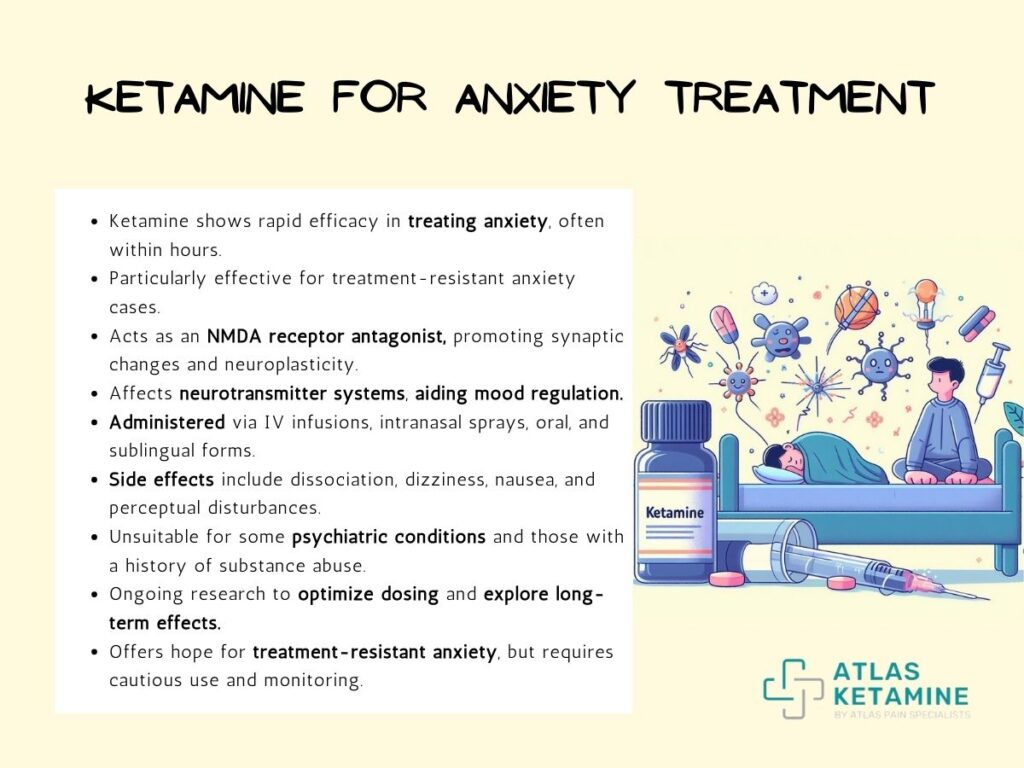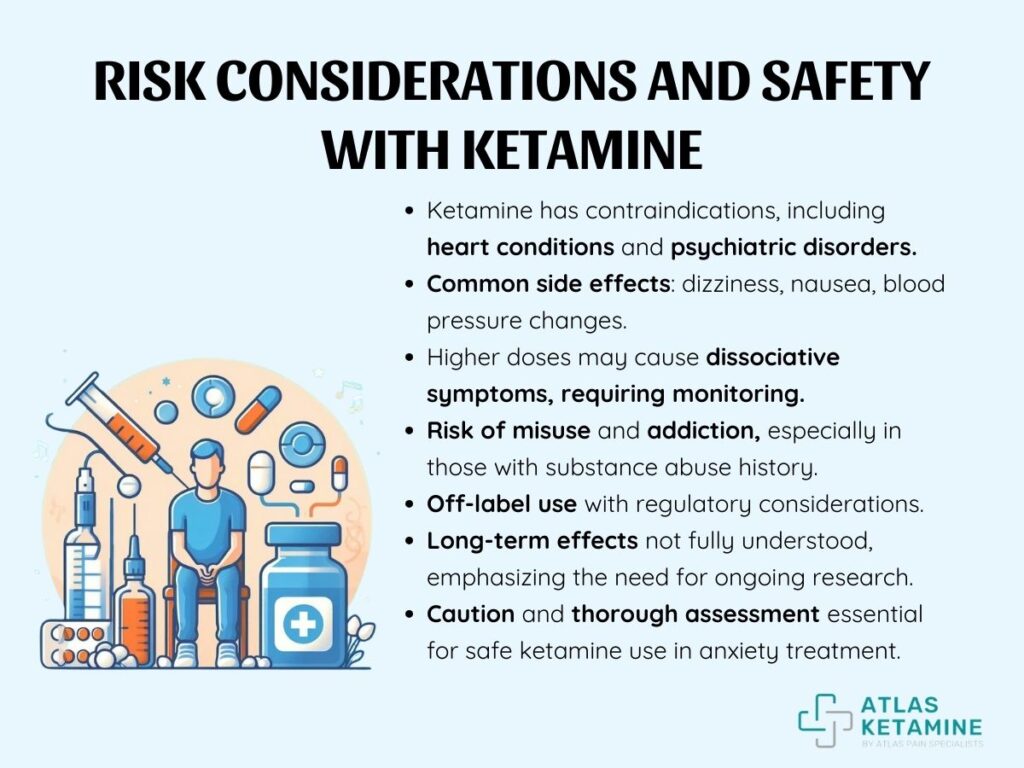In the realm of mental health treatments, one name has been making waves in recent years for its potential to offer rapid relief to those grappling with anxiety disorders: ketamine for anxiety relief.
Originally developed as an anesthetic, ketamine's journey from the operating room to the psychiatrist's office has been nothing short of remarkable. This article embarks on a journey to unravel the complexities of ketamine's role in anxiety relief, delving into its mechanisms, effectiveness, administration methods, risks, and the current state of research.
As we navigate the landscape of mental health care, let's explore how this dissociative anesthetic is rewriting the script for anxiety sufferers, offering newfound hope in the battle against this pervasive and often debilitating condition.
Table of Contents
Understanding Ketamine
Ketamine, first synthesized in the 1960s as an anesthetic, is known for its unique properties of inducing dissociation and analgesia without significant respiratory depression. Although it was initially used in both human and veterinary medicine, its psychoactive effects led to recreational misuse, resulting in stricter regulatory controls.
The drug primarily acts as an antagonist to the NMDA receptor in the brain, a part of the glutamatergic system involved in synaptic plasticity. This action, along with its effects on other neurotransmitter systems, is believed to contribute to its potential in treating mood and anxiety disorders.
In recent years, ketamine has gained attention for its rapid effectiveness in treating severe mood disorders, particularly major depression and anxiety, especially in cases where traditional medications have failed. Its ability to promote neuroplasticity might underlie these effects.
While its use in psychiatric applications is growing, often off-label, its potential for misuse and the need for careful medical supervision remain important considerations. Ketamine's evolution from an anesthetic to a potential psychiatric treatment highlights the ongoing development in medical science and the search for effective mental health treatments.
Ketamine for Anxiety Treatment
Ketamine's emerging role in anxiety treatment signifies a notable shift in mental health therapies, particularly due to its rapid efficacy and unique pharmacological profile.

- Efficacy in Clinical Studies
In various clinical studies, ketamine has shown promising results in providing rapid relief from anxiety symptoms, often within hours of administration. This stands in stark contrast to traditional anxiolytics and antidepressants, which generally take longer to show effects.
Its efficacy is particularly notable in treatment-resistant anxiety cases, where other standard treatments have failed to provide relief.
- Mechanism of Action
Ketamine primarily acts as an antagonist to the NMDA receptor, which is believed to be crucial in its effectiveness against anxiety. This mechanism facilitates rapid changes in the brain's synaptic connectivity and neuroplasticity, contributing to therapeutic effects.
Additionally, ketamine affects several neurotransmitter systems, which may further aid in mood regulation and anxiety alleviation.
- Administration Methods
The administration of ketamine for anxiety typically involves intravenous infusions, which is the most studied method and is done in a controlled clinical environment.
Another route of administration is through intranasal sprays, like ketamine, which has gained approval for treatment-resistant depression and shows potential for anxiety treatment. Oral and sublingual forms of ketamine are also under research, offering more accessible treatment possibilities.
- Patient Experiences and Side Effects
Patients undergoing ketamine therapy report a range of experiences, from mild dissociation to more intense perceptual changes. The treatment is often associated with side effects such as dizziness, nausea, fluctuations in blood pressure, and perceptual disturbances.
There are also concerns regarding the potential for dissociative experiences and hallucinations, particularly at higher doses.
- Risk Considerations and Safety
Ketamine treatment is not suitable for everyone, particularly those with certain psychiatric conditions like psychosis or a history of substance abuse. The drug's potential for misuse and addiction, stemming from its recreational drug history, necessitates rigorous patient screening and monitoring during treatment.
- Regulatory Status and Future Research
While the use of ketamine in treating anxiety is often off-label, the FDA's approval of ketamine for treatment-resistant depression marks a growing acceptance in mental health care. Research is ongoing to understand ketamine's long-term effects, optimize dosing, and fully explore its potential in anxiety treatment.
All in all, the introduction of ketamine as a treatment option for anxiety offers new hope, especially for patients with treatment-resistant conditions. Its rapid action and unique mechanism of action compared to traditional treatments are significant.
However, its use must be approached cautiously due to possible side effects and abuse potential. Future research and clinical practice will continue to refine our understanding and use of ketamine in mental health care.
Risk Considerations and Safety
Ketamine's use in treating anxiety, while showing promise, comes with various risk considerations and safety concerns that necessitate careful management.

- Contraindications and Patient Suitability
Ketamine is not suitable for everyone, particularly those with certain heart conditions, uncontrolled hypertension, or specific psychiatric disorders like psychosis. Prior thorough medical and psychiatric evaluations are essential.
- Side Effects and Monitoring
Common side effects include dizziness, nausea, changes in blood pressure, and perceptual disturbances. Patients may also experience dissociative symptoms at higher doses, necessitating close monitoring during and after administration.
- Potential for Abuse and Addiction
Due to its history as a recreational drug, there's a risk of misuse and addiction, especially in individuals with a history of substance abuse. In clinical settings, this risk is mitigated by controlled dosing and vigilant patient monitoring.
- Regulatory and Legal Considerations
Often used off-label for anxiety, ketamine requires careful consideration and specific consent procedures, adhering to local regulations and guidelines.
- Long-Term Effects and Research Gaps
The long-term effects of ketamine treatment for anxiety are not fully understood, highlighting the need for ongoing research and cautious use.
In summary, while ketamine offers a new avenue for anxiety treatment, its use must be approached with caution, ensuring patient safety through careful assessment, monitoring, and adherence to regulatory standards.
Clinical Application and Treatment Protocols
The clinical application of ketamine in anxiety treatment involves carefully controlled settings and treatment protocols. Patients receive ketamine in a clinical environment with continuous monitoring and precise dosing.
Treatment plans are individualized to cater to each patient's unique needs. Ketamine therapy may be complemented by psychotherapy and emotional support. Patient selection includes medical and psychiatric assessments to ensure suitability.
Response to treatment is closely monitored, allowing for adjustments to the treatment plan as needed. This comprehensive approach aims to provide safe and effective anxiety relief with ketamine therapy.
Research and Future Directions
Research into ketamine's use for anxiety treatment is an actively evolving field with several focus areas. Ongoing studies aim to understand its long-term effects, optimize dosing and administration methods, and unravel the precise mechanisms of its action.
Ketamine shows promise in treating anxiety, especially in cases resistant to conventional therapies. However, research also addresses safety concerns, the potential for misuse, and the need for individualized treatment plans.
As research progresses, ketamine may become a more established option for anxiety relief, provided that it is administered with careful consideration of patient needs and safety.
Conclusion: Will Ketamine Treatment Help Manage Anxiety?
Ketamine treatment has shown promise in managing anxiety, particularly in cases where traditional treatments have failed. It can provide rapid relief from anxiety symptoms, but its effectiveness varies among individuals.
Ketamine is typically administered in a controlled clinical setting and should be considered under the guidance of a healthcare provider. However, its long-term safety profile and the potential for misuse require careful consideration.
Decisions regarding ketamine treatment for anxiety should prioritize safety and be made in consultation with a qualified medical professional. The approach to ketamine therapy must be cautious and individualized, taking into account its unique pharmacological profile and potential risks.
As research continues to uncover the complexities and capabilities of ketamine, it may well establish itself as a significant tool in the treatment of anxiety and other mental health disorders.
